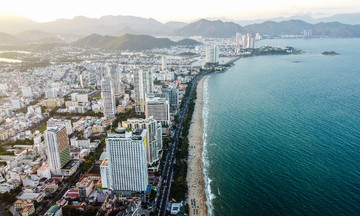"It's called a raise, but the actual amount received is negligible. I feel no motivation to strive anymore," said Nam Anh, a 35-year-old technology engineer in Hanoi.
Before the raise, he took home over 80 million VND after tax each month. According to the current tax brackets, income above this level is taxed at 35%, the highest rate.
"My wife told me to stop working and use that free time to take the kids for a walk," the father of two recounted.
 |
Consumers shopping at a supermarket in Cau Giay on 3/8. Photo: Phan Duong |
Consumers shopping at a supermarket in Cau Giay on 3/8. Photo: Phan Duong
For the past 6 years, Bao Ngoc, a 45-year-old senior marketing manager who has worked for two large corporations, has had to curb her income. "I take on fewer projects, trying to control my average income so that by the end of the year, my personal income tax rate only reaches the 30% threshold," she said.
For Ngoc, this isn't just a financial calculation; it's also a way to preserve her personal time. "If I work hard to increase my income by 10 dong but lose 3.5 dong to taxes, why bother?" she said.
Ngoc and Nam Anh belong to the group potentially subject to Vietnam's highest personal income tax rates. The law divides income into 7 brackets, with progressive taxation applied to each portion. The 35% rate applies to those earning over 80 million VND per month, a threshold set in 2009. They feel this rate is excessively high, negating any incentive to increase their earnings.
"The principle is that higher earners should pay more taxes. But keeping the ceiling unchanged for 16 years, while prices and incomes have changed, is creating considerable discontent," commented Dr. Nguyen Ngoc Tu, former Director of the Department of Organization, General Department of Taxation.
Experts highlight three major grievances. First, personal income tax is similar in nature to corporate income tax, differing only in the taxed entity. While corporate income tax has been adjusted 5 times, decreasing from 32% to 20%, and even to 15-17% for small and medium-sized enterprises from 1/10/2025, personal income tax has remained unchanged since its inception.
In 2024, state budget revenue exceeded 2 quadrillion VND for the first time. Personal income tax contributions reached 189 trillion VND (over 9.3%), while 5.2 million business households contributed less than 26 trillion VND (1.8%). This disparity demonstrates the tax burden borne by salaried employees.
Second, international comparisons reveal that many developed countries apply personal income tax rates of 35-45%, but their average GDP per capita is typically between 34,000-80,000 USD/year, coupled with comprehensive social security systems providing strong support for healthcare, education, and housing.
Third, the current tax brackets are no longer realistic due to inflation and high living costs, especially for essential goods and housing. Statistics show that salaried workers in Hanoi and Ho Chi Minh City find it even harder to buy a house than those in Singapore, a country with a GDP per capita of over 90,000 USD and a personal income tax rate of 22%.
"Applying high personal income tax rates in Vietnam, while the average GDP is about one-tenth that of developed economies, is paradoxical," Tu said.
According to experts, maintaining high tax rates for years not only erodes workers' income but also their motivation. Many middle- and high-income earners are losing their drive to work and are hesitant to take on new responsibilities, believing the actual rewards don't justify the effort.
Bao Ngoc’s story is a prime example. Her company is known in the industry as a "people grinder," and colleagues jokingly refer to the company sofa as "Ngoc's bed." For years, she juggled one project after another, leaving the office at 11 p.m., grabbing a quick meal at home, and continuing to work until 2-3 a.m.
"Back then, I worked like I was selling my life," she said.
All this earned her a dream salary and, of course, the highest personal income tax bracket. However, her mental health began to suffer. One summer afternoon in 2019, as she got into a taxi to meet a client, a Southern folk song came on the radio. Childhood memories flooded back. "I burst into tears for 20 minutes," she recounted. "That was the moment I knew I had to stop."
Today, Ngoc is a freelancer, working about ten days a month, controlling her income to stay below 1.2 billion VND annually to avoid excessive taxation. Her spending habits have also shifted towards greater frugality.
Ngoc's changed behavior reflects the reality that under a heavy tax burden, workers adjust both their work habits and spending. This not only impacts individual lives but also reduces purchasing power, a crucial factor for economic growth.
This is why the Ministry of Finance is considering adjusting personal income tax over the next 5 years, with two options: reducing the number of brackets and widening the income ranges, although the highest tax rate would remain at 35%.
Dr. Nguyen Ngoc Tu, along with other experts, proposes lowering the tax ceiling to 20-25% and increasing personal deductions to encourage transparent wealth creation, savings, and investment, rather than stifling the workforce as is currently the case.
Lessons from the UK and other developed nations show that high tax rates are creating a HENRY (High Earner, Not Rich Yet) class. These individuals earn over £100,000, face high taxes, and lose benefits. Consequently, many intentionally reduce their income or working hours to avoid exceeding the threshold. 2022 data revealed over 10,000 people capped their income at £99,000 - £99,999.
The Economic Times published an article highlighting how doctors working fewer hours (to keep their income below £100,000) is a personal financial strategy, but it leaves hundreds of thousands of patients waiting longer in clinics.
In Vietnam, tax avoidance is not uncommon, according to lawyer Nguyen Van Duoc, Head of the Policy Board of the Ho Chi Minh City Tax Agent and Consultant Association. He suggests lowering the ceiling to 30% or even less.
"Reducing taxes doesn't necessarily mean reducing budget revenue. When production, consumption, investment, and talent all thrive, the revenue stream becomes more sustainable. Vietnam could even attract income tax revenue from international workers and limit the outflow of Vietnamese income abroad," he emphasized.
 |
Thai Dao during a trip to the US in 6/2025. Photo: Provided by the subject |
Thai Dao during a trip to the US in 6/2025. Photo: Provided by the subject
For many years, Thai Dao, 48, a senior executive at a US textile company in Vietnam, has also paid over 80 million VND per month in personal income tax, totaling over one billion VND annually. This amount is enough to buy a small apartment in the suburbs, but for him, it's a civic duty and has never been a reason to reduce his workload or leave his position.
"But sometimes I still feel it's unfair because the returns from the living environment and benefits are not commensurate," Dao said.
His perspective shifted earlier this year. Hearing about the government's tuition waivers, meal support for semi-boarding students, and upcoming hospital fee reductions brought him joy. Suddenly, the substantial sum he'd steadily paid for 16 years was no longer just impersonal figures on a tax form but became tangible in meals, classrooms, and hospital beds for the less fortunate.
"Even though I don't fully enjoy the fruits of my labor, I'm happy because life is about sharing," he said.
Phan Duong












